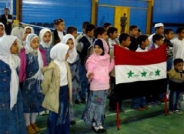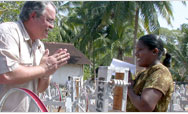 |
|
 |
 |
 |
| USAID Information:
External Links:
|
|
 |
 |
|
 |
 |
|
Iraq

SNAPSHOT
Date of independence: 1932
Population: 27.5 million (2007)
Income per person: $2,900 (2006 est.)
Source: World Bank Development Indicators
USAID
Committment to Iraq (pdf, 10MB)
USAID IN IRAQ
www.usaid.gov/iraq
CONTACTS
Mission Director
Christopher Crowley
USAID/Iraq
APO AE 09316
Tel: 202-216-6289
Director, Office of Iraq Reconstruction (Washington)
Thomas Staal
Tel: 202-712-0448
Email: tstaal@usaid.gov

Children in southern Iraq celebrate
International Day for People with
Disabilities (PWDs). To promote the
integration of the disabled into Iraqi
society, the event encourages the
PWD community to participate in
festivals, art displays, workshops,
sports competitions, and lectures.
USAID's Iraq Community Action
Program (CAP) works in rural and
urban communities across Iraq to
promote democracy and to prevent
and mitigate conflict. Working through
partner NGOs and in consultation with
local government counterparts, CAP is
creating representative, participatory
community groups to identify critical
priorities and implement programs to
address those needs. (Photo: Mercy Corps)
Overview
The rebuilding of Iraq is the largest reconstruction effort since the Marshall Plan. Since 2003, USAID has been committed to improving the lives of Iraqis, through encouraging economic growth, supporting democracy, rehabilitating health and education systems, providing humanitarian assistance to displaced and vulnerable populations, and restoring and upgrading infrastructure such as sewage, electricity, and access to clean water.
The goal of the Administration’s strategy is to help Iraqis establish a constitutional, representative government that respects civil and human rights; is able to maintain domestic order and keep Iraq from becoming a safe haven for terrorists; is capable of proving essential and other services to Iraqi citizens; and is able to harness its economic potential to create jobs and other opportunities for its people.
Programs
Governing Justly and Democratically
USAID-managed programs are facilitating democratic transformation in Iraq. USAID worked to support the successful constitutional referendum, in October 2005, and two national elections, in January and December 2005. USAID continues to support building the capacity of provincial and city authorities to provide essential services. In the field, assistance teams work with the Provincial Councils to help them shoulder the burden of decentralized power. USAID launched a National Capacity Development program, Tatweer, in September 2006 to bolster the capacity of mid- and senior-level management in the ten Iraqi ministries.
Economic Growth: Economic Opportunity
On the economic front, USAID has worked with Treasury, and other agencies to help build Iraqi governing capacity, particularly at the Central Bank of Iraq and Ministry of Finance. Our assistance to the Ministry of Finance includes the design and placement of a Financial Management Information System (FMIS), to track its budget and expenses. USAID provides technical assistance for Iraqi World Trade Organization accession. USAID-supported microfinance institutes have established 31 microfinance offices in 16 provinces, and recently trained and hired an additional 12 loan officers for Baghdad to expand city markets in support of the Baghdad Security Plan. Combined USG and Iraqi resources have provided a total of 43, 591 microfinance loans generating 57,976 jobs.
Economic Growth: Infrastructure
From 2003 through the fall of 2006 USAID’s infrastructure program added 1,292 megawatts of new or rehabilitated electrical generation capacity to the national grid. USAID partners have refurbished or expanded 19 water treatment plants in five cities in Iraq increasing the supply of potable water from USAID projects to over 3.1 million Iraqis. USAID projects have also provided sewage treatment to over 5.1 million people and have provided plant-level operations and maintenance training and support at major potable water and sewage treatment plants nationwide to ensure that these plants continue to function. USAID’s rural water program has installed over 70 small water treatment systems in rural communities of less than 5,000 people throughout Iraq. The rural water program helped to supply clean water to over 400,000 villagers each day.
Investing In People: Health and Education
USAID has helped to strengthen essential primary health care services throughout Iraq. In 2005 alone, USAID-supported emergency campaigns immunized 98 percent of Iraqi children between the ages of one and five years (3.62 million) against measles, mumps, and rubella. Also in 2005, USAID immunized 97 percent of Iraqi children under five (4.56 million) against polio. This program was completed in the summer of 2006. USAID worked with the Ministry of Education and the Ministry of Higher Educaton to improve access to quality education in Iraq at the primary, secondary, and university levels. In support of this mission, USAID has rehabilitated thousands of schools since 2003. At the same time USAID and UNESCO provided millions of new textbooks. USAID completed all of its education programs by the winter of 2006.
Stabilization
USAID is working with U.S. and multinational units to help cities recover from the effects of fighting and revitalize the local economy. These projects consist of a combination of small, rapid activities, followed by more complex projects that operationalize public services, promote representative local government, and help resuscitate the economy.
Back to Top ^
|


